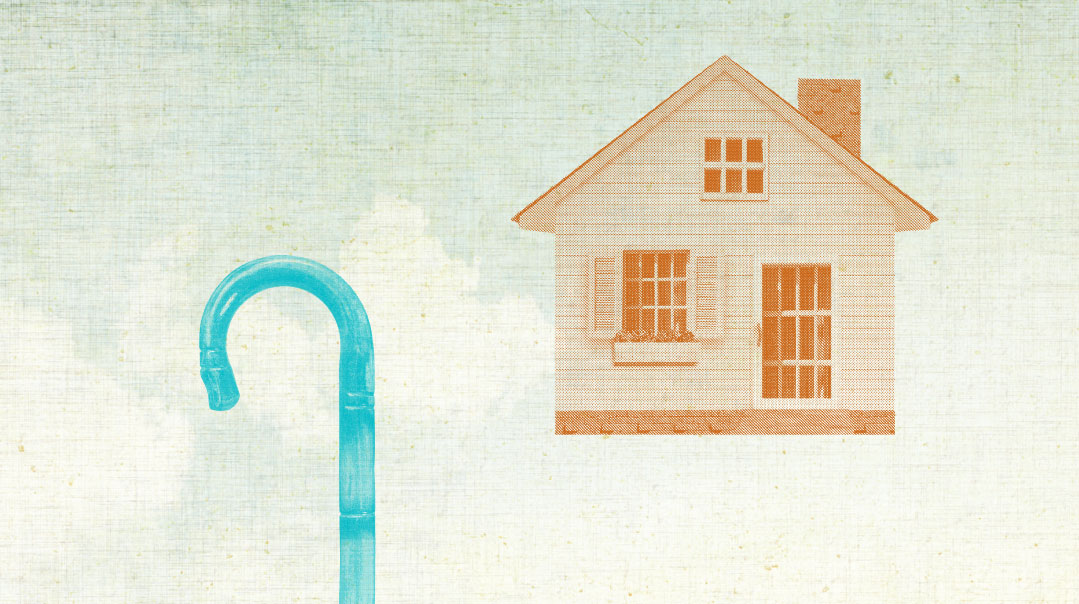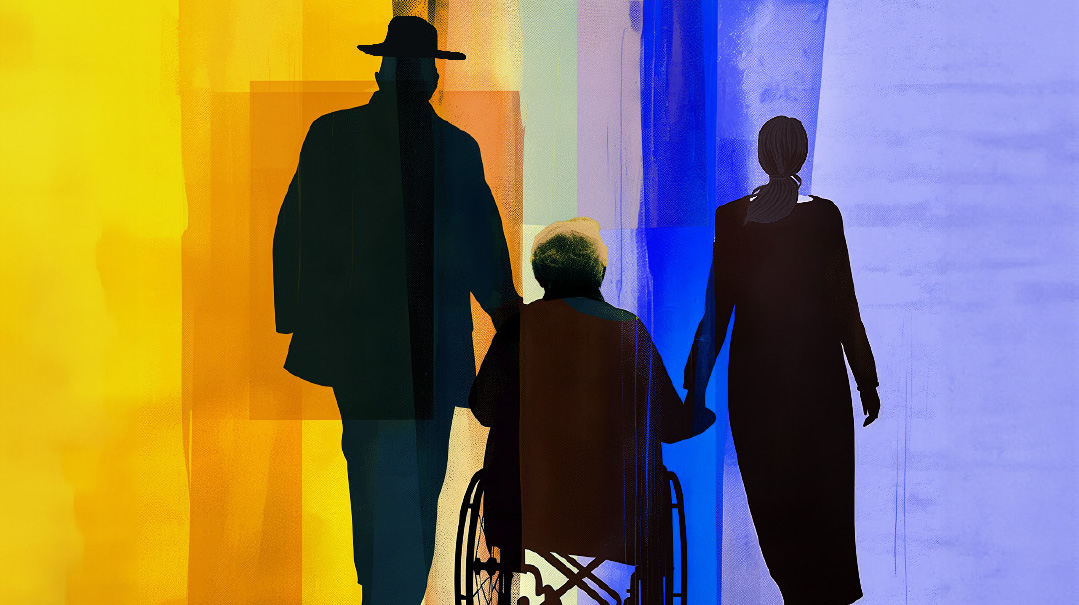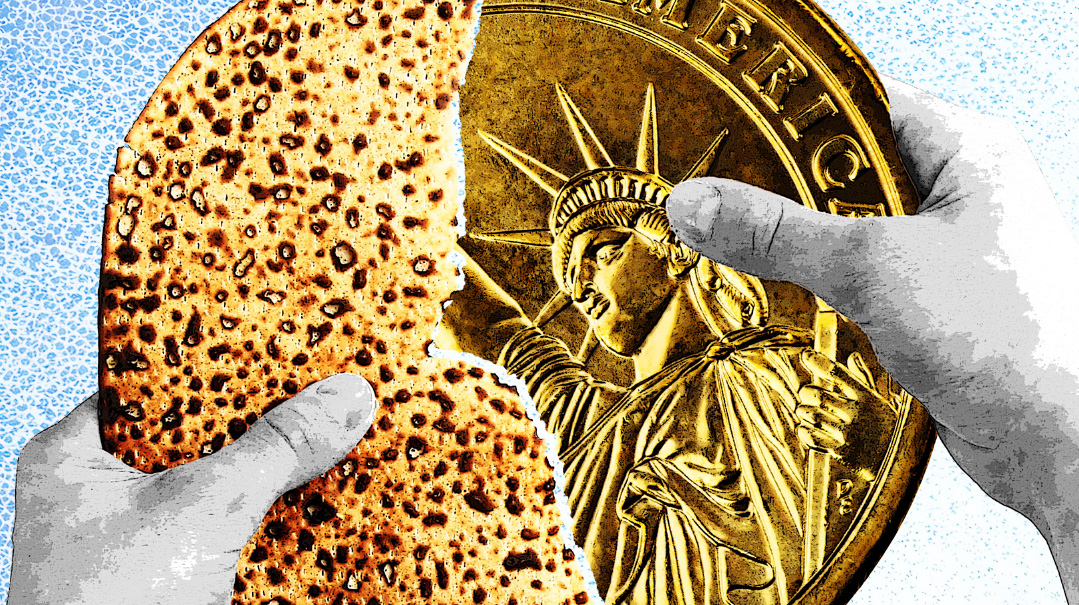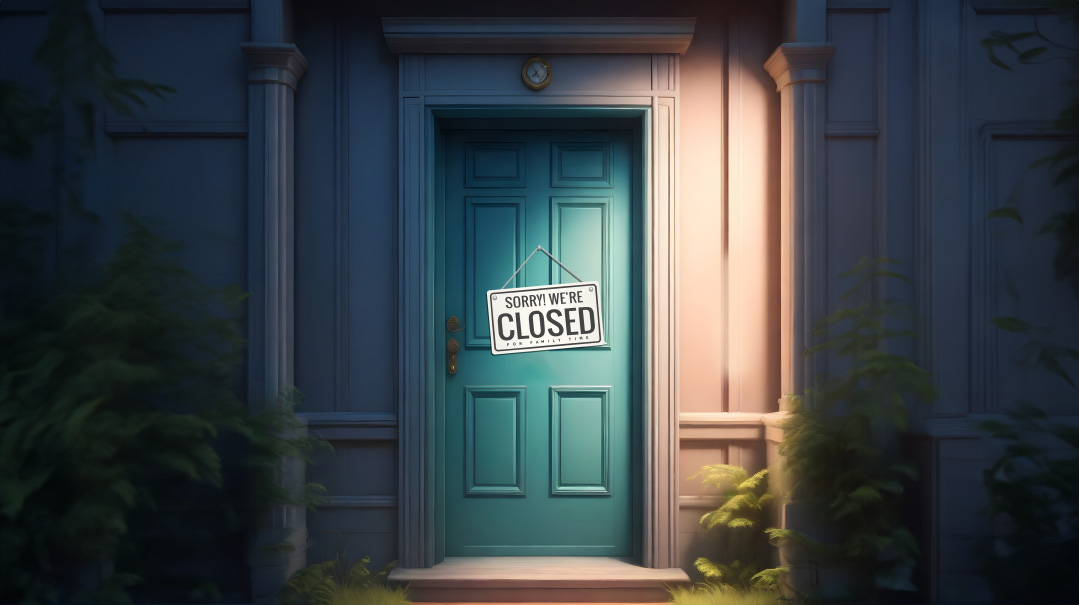No Place Like Home
| November 13, 2019"Who would want to be in an institution when they could live in a real home with their own family?”

Yaeli: If you’d only help me a bit, we could keep Mommy in our own loving home
Binyamin: You can’t expect us to become martyrs for your cause
I
t was Leah Gross on the phone again.
“Sorry to bother you, Yaeli,” she said. “I just knocked on your mother’s door and she didn’t answer. I doubt it’s an emergency or anything, but maybe pop over and check if she’s okay?”
I had just walked in from a four-hour shopping marathon with my kallah. We’d gone from the sheitel salon to the mall and then across town for her makeup trial. She looked radiant; I looked as exhausted as I felt.
“Sure, Leah, thanks for calling, and for being such a good neighbor to Mommy. We’re lucky you keep checking in on her.”
Bassy flitted up the stairs, a shopping bag swinging from each arm. “Thanks, Ma! I’m finished! Going to rest.”
My shins were aching. I was craving a coffee. Maybe one of the others could go check on Mommy?
But Libby was at work and Mali was in the middle of baking, and I hated asking Shulamis — she was only a daughter-in-law. I lived the closest, in any case.
I sighed and headed back out. No point in a coffee I had no time to savor. Hopefully, if all was okay, I’d be back within the hour. And if it wasn’t, I doubted even coffee would be enough.
Libby called later. “I saw your text, how’s Mommy?”
I put the phone on speaker so I could start preparing supper. Everything was off schedule, thanks to the emergency call. “She’s fine. I mean, she was asleep on the couch, and she left out some food, probably overnight, and there were flies all over it, but she’s okay. I don’t know how long we can continue like this, though.”
“Right. We’ve been discussing it, Binyamin and I. We’re having a meeting tonight, 9 p.m. at Mali’s house, to discuss our options — just letting you know.”
I stared at the screen. Letting me know? Wasn’t I the one dealing with the daily crises, wasn’t I the one who kept asking them to help out? And I was making a chasunah.
“Thanks for letting me know,” I said, my voice tight. “I have a bit of a crazy schedule, actually. Can’t we push it off to tomorrow?”
“Not gonna work. Mali’s hosting some event. If you can’t make it, I guess we’ll fill you in afterward.”
That was too much. I might have been the youngest, but I was the one most involved in Mommy’s care, and of course I was going to be part of the decision-making. “Don’t bother,” I told her, trying to keep the edge from my voice. “I’ll be there.”
***
The meeting ended up taking far too long. The house was quiet when I got back, and Pinny was sitting at the kitchen table, swaying over a sefer.
“How was it?” he asked.
“Terrible.” I sank into a chair and kicked my shoes off. “They spent the whole time talking about assisted-living homes, like it was a given that we’re putting Mommy in one. And I couldn’t get a word in, either. It’s Binyamin and Libby, Binyamin and Libby, Binyamin and Libby. They were talking about dates and details and paperwork, and Mali went along with everything.”
“Shimon wasn’t there, I’m assuming?”
“Shimon was on the phone in the beginning, he said he’ll drive over when Mommy moves out, to help with that.”
“And you said anything?”
“I tried! I asked what’s the deal with these homes, why can’t Mommy come to live with one of us, but you know how it is. Binyamin thinks I’m still five years old or something. He was all patient, and patronizing — no one has space, no one has time, this is the best solution, Mommy herself would prefer it. But honestly, I’m sure she wouldn’t. Who would want to be in an institution when they could live in a real home with their own family?”
Pinny listened, thoughtful. Then he said, “What about us? Why shouldn’t we offer to have Mommy here? I mean, we have the space, you’re not working out of the house, we could do it.”
A tentative hope stole through me. “Really? You’d be okay with it?”
He shrugged. “I don’t see why not. It’s a huge mitzvah, and besides, for the past few months you’ve been by Mommy at least once a day. It’s not as if this is a whole new problem.”
I was texting my siblings before he even finished speaking.
***
Of course, it wasn’t so simple.
First off, no one seemed to take me too seriously. Libby said something about how sweet it was for me to offer, but they’d manage to sort something out. That left me incredulous. Did they have no idea that I was an adult, for heaven’s sake? That if I made an offer, I was serious? I was marrying off a child, I wasn’t a baby anymore.
And making a wedding, I discovered, was none too simple. Invitations, guest lists, color schemes. We found gowns for three of the girls, but my middle daughter couldn’t find a thing she liked. Then the hairdresser realized she’d double-booked and we were scrambling to find a new one. And Leah Gross, helpful neighbor that she is, kept calling to share her worries about Mommy.
Sometimes, it was nothing, and sometimes Mommy really did need my help. I was dashing over each night to check she’d eaten, to help clean up, and running back to take care of my own family. “Having her in our house would be easier, not harder,” I told Pinny once. “I wish everyone would agree on this already.”
Binyamin called one night, when I was in the middle of making a dozen calls to people who might have a pale gold gown for a slightly chubby 15-year-old.
“Yaeli, listen,” he said. “I know you have this idea about Mommy moving in. It’s really nice of you, we know how busy you are right now. But I don’t think it’s going to work. Mommy told me a while back that she’d rather be in a facility than become a burden on her children. Libby and I have found an option that seems really nice, near her house, well-run, lots of activities and things. We’d like to have her move in next week.”
So that was how little they made of my offer. My jaw tightened.
“Binyamin, she won’t be a burden. We want her here.”
He sounded taken aback. When was the last time his baby sister argued with him? “I know you do, but this is what she wants, okay?”
“No, it’s not.” I slammed my pen down. The list was making me dizzy, all crossed out and scribbled over. So many numbers, so many phone calls, and here I was having the most ridiculous argument with my oldest brother. Wasn’t it obvious that it was better for Mommy to live with her own children than in a cold-hearted institution?
What did Binyamin know, anyway? I was the youngest, and I’d always been close with Mommy. I remembered preparing for my own chasunah; it was so emotional for both of us. And now I was marrying off my first, who would’ve believed?
Binyamin was still speaking, exaggerated patience oozing down the line. “Yaeli, it’s a big deal taking in an elderly parent, it’s not so simple.”
That stung. I thought of Pinny and tried to match his calm, reasonable tone. “I can handle it, Binyamin. I don’t see why we can’t at least try it.”
The phone was heavy with silence, for one minute, two. I could picture his eye roll, a shrug of resignation.
“Okay,” Binyamin said, finally. “Try.”
***
Mommy moved in two weeks before the chasunah. It couldn’t have been a worse time, but my siblings insisted she couldn’t wait another month. On that point, I actually agreed with them, though it was a shame they couldn’t have come to the conclusion any earlier.
We spent a couple of days (and a lot of money) setting up a room for her, stocking up the pantry with low- sodium food, and we spoke to the kids about what the change would mean for them.
Bassy was the only one who seemed worried. “But Ma, there’s so much to do still!” she wailed, when I had to cancel another urgent shopping trip.
“We’ll be fine,” I assured her, but I wondered.
My siblings weren’t much help, either. Shimon didn’t end up coming to help with the transition over to my house, so it was just me and Binyamin figuring out what to pack, what to store, and how to explain the move to Mommy. She was restless and agitated at the idea of leaving home, and didn’t respond much to any of us. Libby and Mali promised to help out, to clean up and pack up the house, just not right now, they were too busy.
Oh, really? I wanted to retort. And I’m not too busy? I’m making a chasunah next week!
But apparently, a chasunah wasn’t such a big deal in their books. They’d all married off their oldest years ago. Binyamin made his fifth chasunah last year. If I said anything, I’d just be opening the door to another barrage of patronizing comments.
Once she arrived, Mommy seemed happy to be with my family, but she was also a little confused. It took time for her to settle in. My organized schedule turned upside-down; after waking, dressing and feeding the kids, I couldn’t sit down with a coffee or plunge into my to-do list: Mommy needed me. Or rather, she wanted to do everything herself, from making coffee to curling her own sheitel, but it was just too dangerous, and I had to intervene. She was fiercely independent yet so needy; sometimes I couldn’t handle the frustration.
A few days in, Pinny hired a part-time aide. “Just to free you up. At least until after the chasunah,” he urged.
I bit my lip. “I wish my siblings would help instead. It’s their mother too.”
Still, having an aide caring for her in her daughter’s home was a better option than stuffing Mommy in some institution where she’d just be another patient. I was cooking specially for her — a separate menu every evening — and overseeing the aide, and she was surrounded by children and grandchildren.
Or rather, by grandchildren, and Pinny and me.
It rankled that my siblings didn’t bother offering to help out. How petty, I thought. Just because they wanted one thing and I wanted another, they won’t be there for Mommy?
I sent a couple of text messages: Mommy’s doing great, would be so happy to see you. Of course, there was no response.
On Shabbos, I finally got to sit down.
Mommy was dozing on the sofa and I was reading a magazine when Suri came in. Suri, my sensitive and gentle 15-year-old. We needed to find a gown for her.
“Ma,” she said, her eyes sad. “We went to sing at the care home today.”
I nodded; she and her friends did it most Shabbosim. “How was it?”
She twirled her ponytail, swallowed. “It was… I mean, I’ve just been seeing it so differently, now that — you know, with Bubby.” She lowered her voice. “Ma, they — the nurses — some of them are just so cold! We saw one of them snapping at a lady that she needs to go to bed. They — it’s like they’re children or something. Ma, I’m so happy Bubby’s not there.”
I looked over at my mother. Her headscarf was crooked and I went over to straighten it.
“You’re right, Suri,” I said. “Baruch Hashem, we can have Bubby with us.”
***
With four days to go until the big day, I did not have time to take Mommy to her doctor’s appointment. I called Mali.
“I’m so sorry,” she said, somewhat genuinely. “I have other stuff on tomorrow.”
I took a deep breath. “Mali, please, I need help. Bassy’s getting married in a few days. A doctor’s appointment is a huge schlep for me. Can’t you arrange your schedule a little differently?”
She was quiet. I could hear what she was thinking: You chose this, Yaeli. You said you could handle it.
And I could deal with it! With a reasonable amount of help from my three siblings living in town.
“She’s your mother, too,” I told Mali tightly.
“I’m really sorry,” she repeated.
In the end, I drove Mommy to the doctor, and Libby gave up her lunch break to meet us there. She sat with Mommy through the appointment and brought her back to my house afterward. That gave me a precious half-hour to dash across town and pick up a gown that someone had said might fit Suri, and get back home in time to give Mommy lunch. After that, I could leave her with the aide.
The aide. Pinny asked me again to speak to my siblings, he thought they should pitch in with the costs. After all, they would have been putting money into her care in any case — and this was much less, since we were taking care of Mommy most of the time.
I just didn’t have the guts to call Binyamin.
***
The chasunah, by the time we got to it, was unbelievably picture-perfect.
Bassy looked like a dream, my girls shone in their pale-gold finery (even Suri with her last-minute acquisition) and Mommy wore a pale blue suit that brought out her eyes. The makeup artist had said she didn’t have the time to do Mommy as well, but I’d insisted, and I was glad.
“Mommy looks amazing,” Mali said to me guilelessly, when I came over to the family table during the dinner. “You’re doing a great job!”
I smiled. Under layers of makeup, I felt my jaw tense. This was it — my chance to speak up.
“Thank you. Actually, I’ve been hoping to speak to you all about that.”
Libby and Shulamis looked up from their conversation, and Shimon’s wife, Ayala, cocked her head. “All of us?”
I took one more breath. “Yes. I think you can all see how happy Mommy is… she’s doing really well in our house, baruch Hashem. But I need your help. If she would be living in a home, you’d pitch in also, come visit, speak to the administration… no?”
They were quiet.
I pressed on, more urgent. “I mean, the aide is costly. I prepare all Mommy’s meals. There’s the appointments that one of us would need to sit in on, and there’s just talking to Mommy and keeping her company at busy times…”
Shulamis looked uncomfortable. “I’ll speak to Binyamin,” she said, in a voice that didn’t bode hopeful.
Libby’s eyes clouded over. “I wish I could help, Yaeli, but I — you know we don’t have what to give.”
“But time? Appointments? Anything?” I looked to Mali; she lived like a queen in her beautiful home. Why couldn’t she contribute something? “There’s an appointment tomorrow morning, actually, and after this wedding we’re all going to be exhausted…” What was going on here? Had Binyamin told them all not to help me or something? Was this a revenge tactic because I hadn’t gone along with their plan?
The music swelled. I had to go back to my daughter. I raised my voice to be heard, one final attempt. “Let me know if you can do anything, okay?”
But somehow, no one was meeting my eyes.
If I could tell Binyamin one thing, it would be:
Mommy seems happy in my home. Why can’t you acknowledge this is best for her, and do your own small part to help out?
Binyamin
Ever since Tatty passed away, I made a point of visiting Mommy every Thursday night.
Of course, we’d pop in through the week as well: Shulamis went around a lot, my teens visited on Shabbos. But Thursday night it was only me.
Almost always, the conversation was practical. Finances, insurance, summer or Yom Tov plans. Mommy liked to bounce her ideas off someone else, and she sorely missed Tatty’s input. As the oldest — and a son — I naturally came to take on that role.
Mommy enjoyed having someone to look after, as well. She fussed over me, offering herbal teas and kokosh cake. Maybe that was why I was the first to notice when things started deteriorating. She stopped baking. Or she baked but left out ingredients, or left something in the oven too long. Eventually, I was making her the tea.
“Is this what the queen feels like?” she tried to joke once. “Or is it just that I’m an old grandma?”
“A queen, definitely,” I quipped. But Mommy didn’t smile.
“I don’t know about that, Binyamin.” She set down her mug, and I noticed her hand tremble a little. “I hate being a burden on you children.”
“Chas v’shalom, Mommy, you’re not a burden.”
“Not yet.” Mommy said wryly. “I’m serious. I’d rather be in a retirement home than have the children struggle to take care of me. Or one of those assisted-living places. You know me, Binyamin, I need my own space.”
I cleared my throat. It was a bit early to talk of retirement homes. “Mommy, please, you should be healthy ad meah v’esrim. There’s no need to worry about it now.”
Mommy pursed her lips. “But there might be, one day.”
She was right. It wasn’t right away, but slowly things started to change. First came that fall, then a decline in short-term memory. My sisters Libby and Yaeli dealt with some of the crises, but when it came to actual emergencies — “Mommy’s hurt, we need Hatzolah!” — the buck landed on me. I expected it though, that’s the nature of being the oldest.
But eventually, the arrangement didn’t make sense anymore. I called Libby, the oldest daughter, and generally a voice of sanity.
“Libby, let’s meet and make a plan for Mommy,” I said. She agreed, and offered to call the others. We set a date and time, and — remembering Mommy’s request, back when she had full lucidity — I researched options of assisted-living facilities well in advance.
“I shouldn’t be long,” I told Shulamis on my way out. “An hour, tops. I don’t see why anyone wouldn’t come on board with this, it’s obvious that Mommy needs more care now.”
Little did I know.
***
“What happened?” Shulamis asked me when I came home close to midnight.
“It was a disaster.” I threw off my jacket. “I should’ve known.”
“They didn’t agree with you that Mommy needs care?” my wife was incredulous. “I literally go there every day to check she has food!”
“No, no, they agree with that. It was just about whether she should be in a facility or live with one of the children.” I scowled. “Which is a code word for us. I know all about it, Libby has a tiny house, Shimon’s out in the boondocks, Mali’s husband would never agree. It’s nice for them to say sweet platitudes like Mommy should be with her children — but not when it’s going to fall on one person! Besides, Mommy always told me she didn’t want to be a burden on us, how she likes her space.”
“What about Yaeli?” Shulamis asked.
“She was the one pushing for this option, actually. She says Mommy has no idea anymore what she used to want, and living in an institution can’t possibly be better than living with her own family. Easy for her to say — she has little kids still, no one’s asking her to do anything.” Privately, I thought the girl lived in la-la land. Oldests don’t get that privilege.
“What did everyone else say?” Shulamis set down a coffee in front of me. I don’t like drinking coffee at night, but I took a sip anyway — maybe it would clear my brain.
“Shimon didn’t care either way, he was on the phone for maybe five minutes. Libby agrees with me. Mali agrees with whoever spoke last.”
Shulamis bit her lip. “What are you going to do?”
“Nothing,” I said shortly. “I’ll speak to Libby tomorrow, we’ll figure it out. I don’t think we have another option anyway.”
Before I got to speak to Libby though, she called me.
“You heard from Yaeli yet?”
I stepped out of the office; Libby calling during the work day was a big deal. “No. What?”
“She wants to take Mommy in herself.”
My mouth dropped open. That was totally unexpected. “Whaat?” Then my sense kicked in. “That’s crazy. She has no idea what it entails. On any level. She’s gonna renovate her house to accommodate Mommy? What about all the expenses? It would add up to more than any care plan that I looked into with her insurance. Besides, Mommy herself didn’t want it.”
Libby wasn’t listening. “Yes, I’m coming — sorry, Binyamin. I need to go. My boss is glaring at me. Just thought I’d let you know.”
I stared at the phone. Impulsively, I dialed Yaeli. Busy tone. Of course — the chasunah was coming up, wasn’t it?
Eventually, I got hold of my youngest sister. But if I’d hoped a reasonable discussion would change matters, I was mistaken. “She won’t be a burden, we want her. I can handle it,” she insisted stubbornly.
Finally, I gave in. “Have it your way,” I told her. Hopefully, as I told Shulamis that night, she’d come to see for herself that it wasn’t going to work. I still had the Golden Age Assisted Living paperwork all ready
***
The Thursday night after Mommy moved out felt strange. On impulse, I texted Shulamis and drove over to Yaeli’s house to say hi. I was still her son, and she would appreciate seeing me, even if everything had changed.
“Ma’s out,” my niece Naomi informed me, eyes curious. I didn’t pay them visits too often. “She went with Bassy for a sheitel appointment.”
“That’s okay.” I curled my lips into a smile. “I just want to say hello to Bubby.”
Naomi shrugged and showed me to Mommy’s new quarters — a small room off the kitchen. It was done up nicely, I had to admit. But then I saw Mommy, sitting in a rocking chair, looking vacantly out the window.
I backed out the room. “Why isn’t anyone taking care of Bubby?” I asked Naomi.
She blinked. “But we are, we check on her all the time. I just went in to her five minutes ago. She said she was fine.”
I gave it up. Of course she was fine, they were feeding her and helping her take care of herself, but it never occurred to them that she had to be stimulated too, treated as the intelligent and strong person I knew existed inside her brittle body.
Later on, I spoke to Yaeli. She sounded stressed out, but I had to know. “Do you ever take Mommy to shiurim, classes, anything? I’m nervous she’s getting bored.”
“What do you mean, bored?” Yaeli asked defensively. “She has us around all the time, we talk to her, sometimes play a game… and we hired an aide, too, to be with her all the time.”
But Mommy needed more than that, Mommy who was always busy with her hands, cooking, organizing, busy with her projects. At the Golden Age home, there were workshops and entertainment all day. And she’d have her own small apartment, she could move around, have her own space instead of a small room off Yaeli’s kitchen.
“Mommy’s turning into the burden she never wanted to be,” I told Shulamis, the morning of my niece’s chasunah. “Yaeli’s not handling it, she keeps texting the others to help her out, and the atmosphere is just getting negative. She wants people to drive Mommy to appointments, to help with cooking, to visit her more, to fund the aide…”
“I don’t see why we shouldn’t all pitch in,” Shulamis said carefully. “You can’t deny that she’s taken on a big job.”
I was exasperated. “Because she wasn’t supposed to take this on! Because we’re helping her to do what Mommy never wanted!”
I felt like I spent all day repeating that. Before the badeken, Libby pulled me aside to tell me that she thought it was time to go back to Plan A. She was struggling for money, she had no time to take off work, and she was being guilt-tripped for nothing.
Shimon cornered me as the waiters were clearing away the smorgasbord. “Yaeli’s nuts,” he said bluntly. “She can’t handle it. Why don’t you do something?”
I put down a half-eaten cream cake and wiped my mouth. “Why don’t you?” I challenged him.
“You’re the oldest,” he grinned, and melted into the crowd again. How helpful.
I caught Mali right toward the end of the chasunah. “Mali, what do you think? How’s it going with Mommy by Yaeli?”
She thought a moment. “I don’t really know who I agree with, but I guess I’ll try to help her out. She needs it. As long as Mommy’s with her, anyway.” Then she broke off, her eyes darting behind my head. I turned. There was Yaeli, resplendent in mother-of-the-kallah satin gown.
“Why are you trying to make things harder for me?” she asked bitterly, without introduction. “I’m doing my best for Mommy. Why can’t anyone help me out?”
Mali backed away. As usual, I was left to pick up the pieces. “It’s not working,” I told Yaeli, as calmly as I could. “Mommy doesn’t want us all arguing. Be mature about this, admit it’s too much for you, and let’s do what’s best for our mother.”
Yaeli’s eyes flashed. “It wouldn’t be too much for me if everyone would pitch in!”
“But it’s too much for us,” I said simply. “It was so generous of you to try have Mommy at home, but we need to think of what’s best for her in the long term.”
If I could tell Yaeli one thing, it would be:
You can’t make yourself into a martyr and demand that we all do the same, when we know all too well that Mommy herself would never have wanted this from us.
(Originally featured in Mishpacha, Issue 785)
Oops! We could not locate your form.












